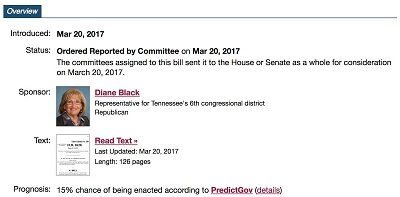
When Republican Congressional leaders shelved their replacement to the Affordable Care Act, John Nay, a recent Vanderbilt computational decision science Ph.D., was not surprised.
PredictGov, the centerpiece of the A.I. startup launched by Nay and two other cofounders, gave the American Health Care Act (HR-1628) a 15 percent chance of success after it was introduced on March 20. PredictGov automatically updates every 24 hours, and the ACHA’s score did not change over its short, five-day life. The vote was cancelled March 24 and the bill was pulled from consideration.
As it happens, 15 percent is higher than average; at most 6 percent of bills introduced into Congress become law. Only potential legislation with little or no controversy gets a probability score much above 40 percent.
But beyond advanced computational science, the gold in PredictGov may be that it can’t be spun.

PredictGov analyzes 100s of variables: factors within the political process, such as the bill’s sponsor, cosponsor, amendments, etc., plus external factors, such as economic trends. It accounts for amendments, riders, plus changes in political circumstances and automatically updates each bill’s score every 24 hours.
“The way we think about things a bill is just a vehicle and many potential policies often hop on and off along the way to the unlikely destination of the U.S. Code,” said Nay, whose research focuses on machine learning, natural language processing, and forecasting.
Other legislative tracking systems have relied on statistical modeling but PredictGov applies a machine learning approach, he said.
PredictGov analyzes text itself plus patterns
At its most basic, machine learning, a subset of artificial intelligence, allows a system to make predictions after sorting through large amounts of data and learning to recognize patterns. The underlying code doesn’t dictate a particular outcome or task but couples data, algorithms and statistics. PredictGov analyzes the text of the bill itself, comparing it to past measures that used similar language, in addition to sifting through scores of other variables.
With legislation analysis as the first offering, Nay and two other scholars have incorporated as Skopos Labs Inc. Professor J.B. Ruhl, who directs the Vanderbilt University Program on Law and Innovation, and Professor Oliver Goodenough director of the Center for Legal Innovation at Vermont Law School, are the other cofounders. The Skopos team also includes Elizabeth Stone, a former Capitol Hill staffer and recent Vanderbilt M.S. graduate.
The predictive score is useful to corporations, other government entities, non-governmental organizations, and lobbyists as well as citizens who want to stay informed, Ruhl said.
“It can help them make decisions about investing efforts in the political process,” he said.
Even the most experienced attorney, lobbyist, elected official, or Congressional watchdog can’t sift through the sheer numbers of data points that PredictGov does. “It doesn’t replicate human judgment but provides insights that help people make judgments,” Ruhl said.
The platform is intentionally agnostic and not designed for the needs of any political party or organization, said Ruhl, who is also the David Daniels Allen Distinguished Professor of Law at Vanderbilt Law School.
In the case of the health care bill, for example, PredictGov gave it a 15 percent chance of passing based on data points, algorithms, and the text of the bill itself – not because of a political agenda, he said.
Skopos Labs has developed a proprietary platform that leverages both natural language processing and machine learning. As AI and machine learning become mainstream terms, both Skopos Labs and PredictGov are getting broad exposure.
NVIDIA, the top provider for hardware for machine learning, recently selected Skopos for its virtual accelerator program. NVIDIA chooses startups with advances in AI and provides hardware tools, marketing support, and other benefits.
GovTrack alliance boosts exposure and interest
The company was accepted into the inaugural class of the Law Tech Lab at Duke University, and took second place after pitches on April 7. Additionally, an alliance with GovTrack.us gives millions of people exposure to PredictGov. GovTrack, a popular resource for tracking federal legislation, embeds the score with a link and a summary on each bill.
“Accurate predicting of what is happening in Congress is a useful tool,” said Josh Tauberer, GovTrack’s founder. “It goes to what is important.”
Now, more than ever, he said, people need unbiased sources of information.
GovTrack, in fact, has seen a significant spike in unique users since President Donald Trump’s inauguration in January. In 2016, the site had about 10 million unique visitors. It had more than 1 million in January 2017 alone, Tauberer said.
“When American is in crisis people start looking up bills and tracking what their senators and representatives are doing,” he said.

Like Tauberer, Nay wants to give people useful, accurate information to guide their actions. PredictGov should help lobbyists, advocates, and citizens focus their efforts and fine-tune strategies as circumstances change.
“Beyond predicting the likely outcome, we provide understanding of the context of the bill,” Nay said.
The platform allows users to easily see how similar measures fared in the past and what main factors contribute to the current score. Advanced features that provide more granular analyses and the legislative ecosystems related to each bill are available by subscription.
Nay said he’s always been interested in the political process. After earning his bachelor’s degree from the University of Virginia, he was awarded a Fulbright Scholarship but turned it down to start graduate school at Vanderbilt’s School of Engineering. His dissertation centered on “a machine learning approach to modeling dynamic decision-making.”
The new venture is aptly named. Derived from “teleskopos,” the Greek word for far-seeing (and the inspiration for telescope), skopos is used in linguistics as well to describe one theory of translating text.
The underlying technology has potential broader applications, including the assessment of online news for so-called fake stories and, in the financial world, tracking changes in a company’s value.
If the fate of HR 1628 tells us anything, even after Trump personally lobbied lawmakers, it is that “evidence-based prediction systems can be helpful in uncertain times,” Nay said.
Media Inquiries:
Heidi Hall (615) 322-NEWS
heidi.hall@vanderbilt.edu